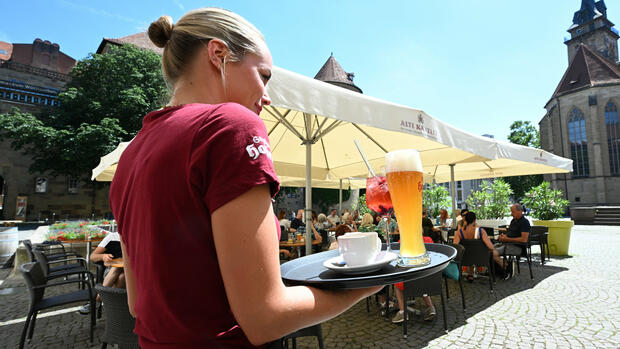Berlin After more than 13 hours, the decision of the Minimum Wage Commission was made: The statutory minimum wage is to be raised from the current €12 per hour in 2024 to €12.41 and a year later to €12.82. Almost six million employees are likely to benefit from the increase.
The meeting of the commission was historic because for the first time there was no unanimous decision. Early on Monday morning, the employee representatives voted against the compromise proposal made by Commission Chair Christiane Schönefeld. “The positions were very far apart,” she said on Monday morning in Berlin.
The employee side openly criticized the decision. Stefan Körzell, board member of the German Trade Union Confederation (DGB), called the proposal “shameful” and “completely ludicrous”. Despite high inflation, the “financially weakest” are making savings. The unions had demanded an increase to 13.50 euros.
From negotiating circles it was said that Schönefeld first made a better offer for the union side during the night: an increase in two steps to 12.94 euros. However, the DGB insisted on 13.50 euros. Ultimately, the other members voted against the DGB and came up with 12.82 euros. According to negotiating circles, the unions had gambled away.
Minimum wage: what’s next?
The recommendation still has to be implemented by regulation from Labor Minister Hubertus Heil (SPD), which he announced on Monday.
The coalition of SPD, Greens and FDP had exceptionally increased the minimum wage by law from 10.45 euros to 12 euros on October 1, 2022. The economist Lars Feld, advisory member of the minimum wage commission, told the Handelsblatt that the unions would promptly demand political intervention again because of their dissatisfaction.
Why is the increase so small?
The fact that the positions of the trade unions and the other members of the Commission are so far apart is mainly due to different perspectives. The increase was only an increase of 3.4 and then 3.3 percent, explained DGB official Körzell. That means two years of real wage losses. For comparison: The Ifo Institute expects 5.8 percent inflation for the current year and 2.1 percent for the coming year.
The minimum wage is set to increase to €12.82 per hour by 2025
“Due to their special basket of goods, minimum wage earners have been much more affected by inflation in recent years than the average household,” says Sebastian Dullien, director of the institute for macroeconomics and business cycle research (IMK), which is close to the trade union. “While wages in other income brackets are expected to make up for a noticeable proportion of the lost purchasing power over the next year and a half, the incomes of those earning the minimum wage are now lagging behind.”
Advocates of a smaller increase see it differently. The reason: They include the statutory increase to twelve euros. Politicians had briefly disempowered the Minimum Wage Commission at the time. If the decision had been left to the Commission at the time, the increase would have been significantly smaller.
The question now is whether the political increase had to be included in the Commission’s new decision. Advisory Commissioner Feld, among others, advocated this. “The loss of purchasing power is more than compensated for, because the legislature had already decided to increase it significantly to twelve euros.”
The twelve euros were based on the SPD’s demand in the 2021 election campaign, when inflation was still significantly lower. “Nevertheless, we have to see this extensive legal increase as securing purchasing power,” explained Feld.
How is the economy reacting?
The employers spoke of a difficult environment due to rising prices. “We struggled very hard to find a solution,” said Steffen Kampeter, general manager of the Confederation of German Employers’ Associations.
The tips of the minimum wage commission at the presentation of the current minimum wage report.
(Photo: dpa)
The managing director of the German Retail Association (HDE), Stefan Genth, told the Handelsblatt that “any form of cost increase” is difficult to cope with in the current environment. Nevertheless, it is a “signal of reason” because the focus was largely on the tariff increases.
The hotel and catering industry had insisted that the minimum wage should not be raised until October 2024. “That would have given the companies some breathing room,” said Dehoga general manager Ingrid Hartges of the Handelsblatt. The companies had to accept increases in personnel costs averaging 21.5 percent in the past few months.
What does the decision in favor of the wage gap requirement mean?
In theory, a higher minimum wage increases the incentive to work. Because the gap between low wages and unemployment benefits is increasing. This incentive is laid down in the wage gap requirement. It was once part of social legislation and set a fixed gap between unemployment benefits and lower-wage earnings.
But because the minimum wage has now only been raised comparatively little, the incentive to work could theoretically even be reduced because the new basic income includes significantly higher rates than the previously applicable basic security. There are likely to be further increases in the near future. Political decisions are made on the amount of citizen money.
At the same time, the question arose in the Minimum Wage Commission as to what effects there would be upwards, i.e. on existing collective agreements. “We had to be careful not to push the tariff structure up too much,” said Commissioner Feld. He also defended the committee’s decision by stating that “many collective agreements” would have had to be raised if the fee had been increased to 13 euros.
What does the inflation decision mean?
In view of the moderate increase in the minimum wage, no additional inflationary pressure should come from the increase. “This is good news in the current, difficult environment,” said Martin Werding.
More: Economic growth is returning more slowly than hoped
